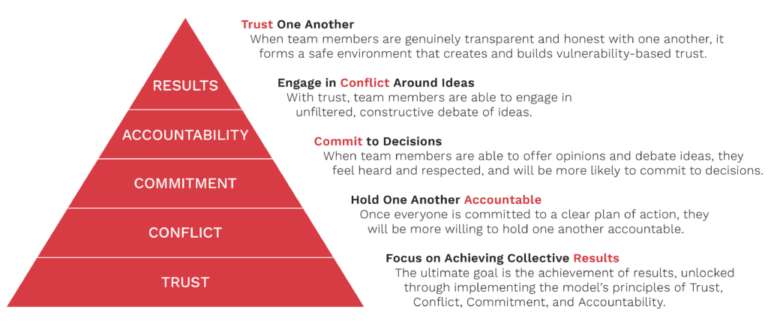Author: Victoria Cohen
Trust is the foundation of success within management teams, shaping the dynamics of effective teamwork. Teams that operate with high levels of trust experience numerous benefits, including increased productivity, engagement, and overall satisfaction. On the other hand, lack of trust breeds an environment of fear, hindering cooperation and meaningful collaboration.
In this blog, we’ll share the impact of trust within management teams, breakdown ways to evaluate trust within your organization, and provide valuable exercises and strategies to develop trust within your team.
High-trust companies yield impressive results, with employees reporting a striking 74% reduction in stress, 106% boost in work energy, 50% increase in productivity, 76% heightened engagement, 29% greater life satisfaction, and 40% decreased burnout compared to their counterparts in low-trust environments. Trust hinges on the willingness to be vulnerable, however, many managers struggle with encouraging vulnerability which is necessary in team development and meaningful conflict resolution. In companies who lack trust as a foundation, team members hesitate to seek help, withhold constructive feedback, and fail to recognize and tap into each other’s talents and experiences.
To illustrate the significance of trust in management teams, we will use Patrick Lencioni’s Five Dysfunctions of a Team pyramid model, examining how trust influences team behavior and performance:

Teams without a strong foundation of trust may engage in counterproductive behaviors that hamper overall performance. Some common dysfunctions seen in teams with a lack of trust are:
Leaders who display vulnerability and seek help from colleagues build trust and cooperation within their teams. This approach fosters a sense of security, encouraging team members to collaborate and feel more comfortable sharing constructive feedback necessary for growth.
By actively encouraging social ties at work, organizations can create a supportive environment where team members perform at their best. Google’s study revealed that managers who show genuine interest and concern for their team members’ success and well-being outperform others in both quality and quantity of work.
Trusting employees with autonomy in managing their projects and tasks empowers them to take ownership of their work. This autonomy not only motivates employees but also fosters innovation and creativity as diverse approaches are encouraged and supported.
Openness about company goals, strategies and metrics reduces uncertainty and stress, fostering a culture of trust. When employees are well-informed about the company’s direction and current standing, it enhances teamwork and cooperation, leading to better outcomes.
High-trust workplaces prioritize the personal and professional development of their employees. By adopting a growth mindset, managers can focus on continuous improvement and offer consistent feedback, nurturing engagement and retention.
Below are some suggested activities and exercises outlined in “The Five Dysfunctions of Team” that can strengthen trust within organizations:
Personal Histories Exercise: During meetings, team members can share personal stories, including favorite hobbies, upbringing, and work experiences. This exercise fosters empathy and genuine connection, breaking down barriers and laying the foundation for trust.
Team Effectiveness Exercise: In this exercise, team members identify the most significant contributions made by their peers and areas that need improvement for the team’s greater good. The blend of positive and constructive feedback promotes personal growth and team development.
Personality Profiles: Utilizing personality assessments like Myers-Briggs or DISC helps team members better understand their strengths, weaknesses, and motivations. This knowledge empowers individuals to build confidence, leading to greater openness about vulnerabilities and better support within the team.
360-Degree Feedback: Although riskier, 360-degree feedback has gained popularity as a developmental tool. When used without regard to compensation or formal evaluations, it helps identify strengths and weaknesses without negative consequences.
Experimental Team Exercises: While ropes courses and other experimental activities may have lost popularity, they still hold value in enhancing teamwork. Creative outdoor problem-solving, support, and cooperation can strengthen team dynamics when used alongside essential work activities.